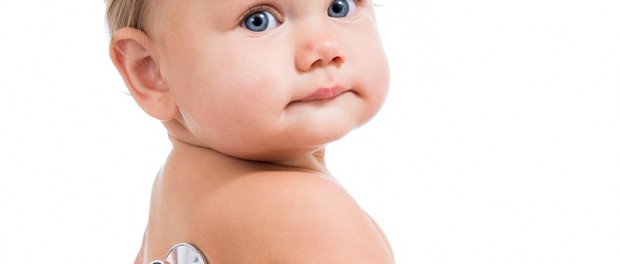Common Sicknesses in Babies and Children

When your baby was born, he had built in immunities that help him fight off diseases and illnesses until he is around 3 months old. This doesn’t mean that he won’t get sick at all, but the chances are much less. When these immunities wear off at 3 months of age, he is susceptible to common illnesses like colds and stomach viruses.
Colds
Symptoms of a cold can vary from a runny nose, a stuffy nose, or sneezing. Usually, children under 6 years of age will have around 6 colds a year. Remember that in the first weeks of life, having the sniffles is normal for a newborn and doesn’t always indicate a cold.
Treatment
Usually, you won’t treat your child’s cold as it has to pass with time. Even when you do offer medicine, it may not reduce the duration of the cold, but help treat the symptoms. If your baby has a stuffy nose that is preventing her from eating, you can use saline drops to help loosen the mucus in her nose. Vapor rub on the child’s chest and feet is also an effective option. If your child is over 3 months old, you can give them an over the counter pain and fever reducer to provide relief from a fever.
Make sure that your child is drinking regularly so they do not become dehydrated. Do your best to teach your older toddler and child to cover their nose and mouth when they sneeze or cough and to use tissues when necessary and throw them away when done.
When to See the Doctor
If your child doesn’t seem to be feeling better after 3 days, they have an earache, are unusually tired, have trouble breathing or wheezing, have a stiff neck, or have a sore throat accompanied by a high fever, you should take them to see the doctor.
Diarrhea
Diarrhea is the frequent passing of loose, watery stools. It can be troublesome for babies and children because it increases the risk of dehydration. Some signs of dehydration include decreased urine output, dry mouth and tongue, and thirst. Diarrhea can be caused by a virus, a new medication, or changes in diet.
Treatment
You can use rehydration sachets or an electrolyte drink to prevent dehydration. Until diarrhea stops, you should feed your child a bland diet of easy to digest foods and limit foods with dairy. Your doctor may recommend only giving your child an electrolyte solution until the diarrhea has ended.
When to See the Doctor
Babies 6 months old and younger should be seen by a doctor when they have diarrhea since they are at greatest risk for dehydration. Children 2 years old and older should see the doctor when a diarrhea episode lasts more than 2 days. No matter what age your child is, you should see the doctor immediately if your child has traveled abroad before they became sick, has any symptoms of dehydration, or has blood in the stool.
